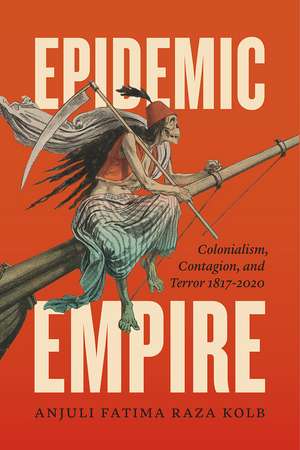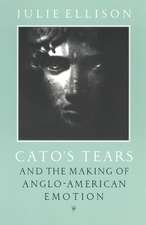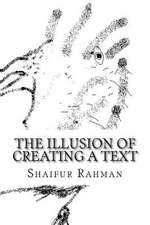Epidemic Empire: Colonialism, Contagion, and Terror, 1817–2020
Autor Anjuli Fatima Raza Kolben Limba Engleză Paperback – feb 2021
Raza Kolb assembles a diverse archive from colonial India, imperial Britain, French and independent Algeria, the postcolonial Islamic diaspora, and the neoimperial United States. Anchoring her book are studies of four major writers in the colonial-postcolonial canon: Rudyard Kipling, Bram Stoker, Albert Camus, and Salman Rushdie. Across these sources, she reveals the tendency to imagine anticolonial rebellion, and Muslim insurgency specifically, as a virulent form of social contagion. Exposing the long history of this broken but persistent narrative, Epidemic Empire is a major contribution to the rhetorical history of our present moment.
| Toate formatele și edițiile | Preț | Express |
|---|---|---|
| Paperback (1) | 289.66 lei 6-8 săpt. | |
| University of Chicago Press – feb 2021 | 289.66 lei 6-8 săpt. | |
| Hardback (1) | 680.99 lei 6-8 săpt. | |
| University of Chicago Press – feb 2021 | 680.99 lei 6-8 săpt. |
Preț: 289.66 lei
Nou
Puncte Express: 434
Preț estimativ în valută:
55.43€ • 59.27$ • 46.21£
55.43€ • 59.27$ • 46.21£
Carte tipărită la comandă
Livrare economică 18 aprilie-02 mai
Preluare comenzi: 021 569.72.76
Specificații
ISBN-13: 9780226739359
ISBN-10: 022673935X
Pagini: 392
Ilustrații: 24 halftones
Dimensiuni: 152 x 229 x 30 mm
Greutate: 0.55 kg
Ediția:First Edition
Editura: University of Chicago Press
Colecția University of Chicago Press
ISBN-10: 022673935X
Pagini: 392
Ilustrații: 24 halftones
Dimensiuni: 152 x 229 x 30 mm
Greutate: 0.55 kg
Ediția:First Edition
Editura: University of Chicago Press
Colecția University of Chicago Press
Notă biografică
Anjuli Fatima Raza Kolb is associate professor of English at the University of Toronto.
Cuprins
List of Figures
Preface: Politics and Scholarship in a Time of Pandemic
Preface: Politics and Scholarship in a Time of Pandemic
Introduction: “Islam,” Terrorism, and the Epidemic Imaginary
Part One: The Disease Poetics of Empire
Chapter 1: Great Games
Chapter 2: The Blue Plague
Chapter 3: Circulatory Logic
Part Two: The Body Allegorical in French Algeria
Chapter 4: The Brown Plague
Chapter 5: Algeria Ungowned
Part Three: Viral Diaspora and Global Security
Chapter 6: Selfistan
Chapter 7: Cures from Within
Acknowledgments
Notes
Bibliography
Index
Recenzii
"The connection between terror and contagion is the explicit subject of Anjuli Fatima Raza Kolb’s Epidemic Empire. . . [This work] illuminates the experience of living through a metaphor made real. . . . Epidemic Empire [offers] valuable lessons in the importance of metaphor to cultural analysis. . . . In showing how we disseminate cultural biases and the social and geopolitical inequities they perpetuate, [this work] open this process to inspection."
“In her forceful and timely debut book. . . Raza Kolb describes a 200-year history during which politicians, Supreme Court justices, policymakers, and novelists have described terrorism as 'a cancer, an infection, an epidemic, a plague.' Identifying the metaphor’s origin during the Indian Mutiny of 1857, she traces it and epidemiology’s coterminous evolution through a rich and unexpected archive of texts including novels by Rudyard Kipling, Bram Stoker, Albert Camus, and Salman Rushdie, as well as colonial epidemiologists' writings and The 9/11 Commission Report. . . . [The book is] a pedagogical lesson, in which epidemiology [is] not just a science but a mode of reading.”
"[Epidemic Empire] will likely become one of this moment’s iconic works of academic literature. . . The prose is lucid and, quite often, lovely: Raza Kolb presents us with a counter-poetics of the disease poetics she is excavating. But this counter-poetics is also a rigorous examination of its object of study. . . . This book is a joy to read. Epidemic Empire borders on the sublime."
“Epidemic Empire is a book with which to reconsider the possibilities of criticism in our terrible time… Raza Kolb is a beautiful reader, careful and wickedly smart.”
“Epidemic Empire is grippingly told—a fantastic story of the coemergence of the epidemiological, colonial, and ‘terrorist’ imaginaries. Raza Kolb's close readings are superb and revealing, and it is urgent that these arguments and methodologies and this archive make their way into the public debate. These debates become more pressing every day, as the long histories of colonial and white national violence become less and less ‘merely’ historical, in the United States and globally.”
“Moving well beyond viral transmission as a metaphor in social, political, or economic life, Raza Kolb’s book offers us an innovative account of violence as a form of contagion in its own right. Showing how medical and political thinking were intertwined in British and French imperialism, she traces the legacy of its distinctive history down to the present day.”
“Raza Kolb renders a startling account of the extent to which figures of illness, disease, and virality saturate quotidian discourses on terrorism and race from the nineteenth century to the present. Uncannily prescient yet historically profound, Epidemic Empire allows us to glimpse the future of pandemics from the racial prisms of the past. The temporal arc is sublime, and the writing, exquisite.”
"It is surprising that no one else has identified the ubiquity of this metaphor until now, and we all should be grateful for Raza Kolb’s demonstrated ingenuity, passion, and eloquence in taking up this formidable challenge. Epidemic Empire, read amidst a global pandemic and the rise of anti-Asian racism in the United States, paves the way for more interventions on how colonial medicine and literary cultures continue to inform our troubled present."
"[A] powerful and challenging study. . . . The book proposes an interesting re-reading of the Foucauldian concept of biopolitics, comparing the different gradations assumed by epidemiological and immune metaphors in specific colonial and imperial events and domains: British India, Algeria during the war of national liberation (thus with France as a counterpart), the United States and more generally the West after 9/11, within the folds of the global wars on terror and their effects."
"Epidemic Empire is truly a multidisciplinary, visionary work—part history of epidemics, part literary criticism, part postcolonial studies, part terror studies. Few ambitious books live up to their potential in the way that this book does. It should be required reading today as we continue to manage and mismanage the COVID-19 pandemic. But Epidemic Empire is not just a book of the present, and will surely help to define scholarship for many years to come."
"The publication of Epidemic Empire is timely not only because it coincides with the ongoing pandemic, but because it also deals with the continued misperception of Muslims as terrorists and Islam as an epidemic of global threat. The book combines a study of famous and little-known literary works with numerous archival documents exclusively from two erstwhile powerful colonizing nations, Britain and France, and their colonies, India, and Algeria. In so doing, it unravels the idea of the epidemic of terrorism in seven impressive chapters."
"Epidemic Empire is intricately structured and lofty, offering a timely contribution to the history of medicine and postcolonial studies . . . [It] is an audacious book and both a profound theoretical narrative and a moral reflection on what it means to medicalize discourses of terror. It is an astute critique of narrative, documenting the literary and public health fervour which is promulgated in Western societies."



















